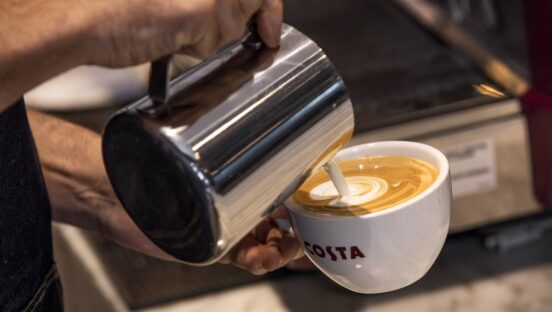Costa Coffee is ubiquitous in the U.K. and Ireland, where it has over 2,800 stores, more than double the number of Starbucks locations in the two European nations. It is now penetrating the U.S. market, but it’s taking a different tack in a country that’s seemingly defined by a Starbucks on every corner.
The 53-year-old chain is a global business, with 4,100 coffee shops in 45 countries. Stateside, it has opened six coffee shops—five in Atlanta and one in the Seattle-Tacoma International Airport—but these are mainly to build awareness and get the brand in front of customers. In fact, the chain’s main goal here is to dominate the B2B world and be the premium coffee served at away-from-home occasions like hospitality, workplaces, convenience stores, and travel locations, largely through its innovative technology, including its Smart Cafe vending machine.
Founders: Sergio and Bruno Costa
Headquarters: Loudwater, Buckinghamshire, England
Annual sales: $297 million (2023)
Total Units: (global and U.S.): Globally around 4,100 plus around 16,000 Smart Cafes; six retail locations in the U.S. and around 250 Smart Cafes
Franchised Units: Zero in the U.S.; around 2,250 globally
The coffee company has ambitious plans. Its goal is to reach $1 billion in total sales in the U.S. within the next decade, including becoming the No. 1 player in the B2B coffee world and outgrowing the overall coffee category.
Costa comes from humble beginnings. In 1971, Italian brothers Sergio and Bruno Costa started developing their signature coffee, from a roastery in Fenchurch Street in London. That coffee became known as Mocha Italia, and a decade later, in 1981, they opened their first store in London and began growing from there, starting in prestigious neighborhoods.
Whitbread, the largest hotel and coffee shop operator in the U.K., acquired Costa in 1995 and held the company for 24 years. In 2019, Coca-Cola acquired the brand for $4.9 billion but just a year later the world closed down with the arrival of COVID. This put, as the British would say, a huge spanner in the works, with coffee shop clientele dwindling to nothing.
Since then, Coca-Cola has upped its game in the coffee realm. A year ago it hired Philippe Schaillee as the global CEO of Costa. Schailee’s background includes stints with Krups, Sara Lee (in a coffee-related role), and Jacob Douwe Egberts.
Costa opened its first U.S. coffee shop in Atlanta in 2022 and now has five in that city, plus a sixth in Seattle. The most recent Atlanta location opened in October.
“Atlanta is a perfect city for us to build the brand experience and brand awareness because Coca-Cola is located here and it’s such a creative city, a cultural hub,” says Erica Brown, managing director of Americas. “Those locations really provide us the opportunity to expose more customers to the brand. We’ll be really disciplined about what we do with those stores. And they’re a great way for us to really understand consumer behavior.”
And airports, Brown says, are a great spot to learn about consumer behavior “because you’ve got people coming from all over the world so it’s a great learning lab if you will. It’s also just a great way to showcase your brand.” Costa chose to open in the Seattle airport, she adds, because it’s often a layover location for travelers going to and from China, and Costa has a strong presence in the country.
Part of this is thanks to Costa’s purchase in 2017 of Chinese coffee chain Yueda. Following this, Costa’s then-CEO Alison Brittain said the company was looking to leave Whitbread in order to expand, with China being a focus of that growth. Coffee’s likely to succeed there as hot drink sales are booming. According to Statista, China generates the highest revenue in the hot drinks market—$ 54.5 billion—and it forecasts that it will continue to grow.
But back to the U.S., while Costa’s opening retail stores, its focus is really B2B, where “people have a real opportunity to engage with the brand,” Brown says
And while Costa is busy getting its name known to the American public and delving into what consumers here want to drink, it’s opening Smart Cafes at a rapid clip and now has 250 open in the U.S. (more than 16,000 globally). These “give Costa a 24/7 opportunity to serve customers and due to their small footprint can fit in many locations. “We have the flexibility to go in anywhere,” Brown points out.
The Smart Cafe is an automated touch screen machine that produces drinks in around a minute and a half. From a three-foot by three-foot footprint, it can create more than 200 “barista quality” drink combinations, says Costa, including a cortado, a cappuccino, and a flat white. Coca-Cola already has extensive experience in vending machines through its Freestyle fountain machines, which launched in 2009 and can offer an array of beverages.
Both the Freestyle and the Smart Cafe are internet-connected machines that can report back to Coca-Cola. This refines and optimizes offerings to understand consumer behavior and choice, helping Costa satisfy consumer desire and innovate.
Costa doesn’t want to be just a coffee shop or just a vending machine option. The company also plans to provide beans and equipment to other channels where coffee is served.
And this year it plans to launch Podio, a coffee pod system for B2B channels. This machine can be self-serve or provided by an establishment, comes in three sizes, and offers a variety of coffees ranging from lattes to macchiatos. The Podio machines can deliver a coffee in just 30 seconds.


